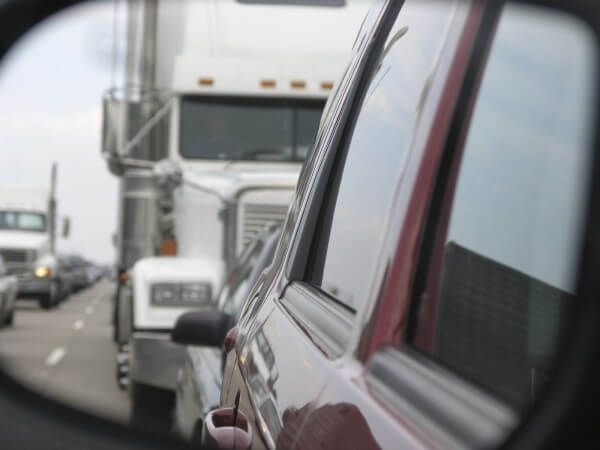Our legal team aggressively investigates every case
Motorists share the road with large commercial trucks every day, and as a rule, we don’t think much of it. That changes in an instant after a collision involving a truck. Because commercial vehicles are so large, they can cause devastating injuries and death even at fairly low speeds.
The law holds commercial truck drivers and companies to a higher standard than individual motorists. When truckers fail to meet those standards and cause accidents, they should be held responsible.
At Flager & Associates, we’ve handled hundreds of cases involving negligent truckers, including all of the following factors:
- Texting/Distracted Truckers
- Speeding Truckers
- Overloaded Trucks
- Fatigued/Asleep-at-the-Wheel Truckers
- Intoxicated Truckers
- Trucks Carrying Empty Loads
Request a free case evaluation or call us today at (215) 953-5200
Regardless of the cause, truck accidents can lead to tragedy. A large commercial truck can weigh more than 25 times the weight of an average passenger car. When a heavy vehicle collides with a lighter one, the damage can be horrific. Drivers and passengers can sustain severe injuries, including broken bones and paralysis. Fatalities are also sadly common in accidents involving tractor-trailers.
Depending on the circumstances of your accident, you may have a claim against the truck driver, trucking company or shipper of the cargo. Unfortunately, that means you’ll likely be up against the trucking company’s insurance – and the adjusters and attorneys they pay well to reduce or deny claims. Even as you recover from serious injuries, you may find that the parties who owe you money won’t return your calls or keep finding excuses not to pay your settlement. They may make a low-ball offer or even argue that you caused the accident.
At Flager & Associates, we’ve heard all the arguments the trucking companies and their insurance companies use – and we know how to fight back. We’ll gather evidence, negotiate on your behalf and take them to court if necessary. Our legal team will take care of your case so that you can focus on your recovery.
Texting/Distracted Truckers
A top reason for accidents is distracted driving, particularly by texting truckers. When truckers and bus drivers are sending or receiving text messages behind the wheel, it’s not only dangerous, it’s illegal. In January 2010, the federal government formally barred bus drivers and truckers from sending text messages while behind the wheel. The legislation is part of a growing effort to make laws to eliminate the threat of distracted drivers.
Texting, of course, is only one of many distractions for truckers. Because they spend their entire working day behind the wheel, it’s quite common for truck drivers to multitask. While driving, they may eat, adjust the radio, talk to a dispatcher or put information into a GPS device. Distracted truckers often overlook smaller vehicles, particularly those that enter the truck’s “No-Zone;” that is, the blind spots on the sides and immediately behind the truck. They may cause rear-end collisions, especially in construction zones and stop-and-go traffic.
We’ve investigated many accidents involving distracted truckers, and our legal team knows how to analyze crash data, witness reports and the trucker’s own statements to prove that he or she was not paying attention to the road. We’ll do everything in our power to hold the truck driver who hurt you accountable.
Speeding Truckers
Truckers are under a great deal of pressure to make their deliveries on time, and trucking companies run strict schedules. Large commercial vehicles are difficult enough to turn and stop when they are operating at legal speeds. When truckers choose to break the law and drive too fast, serious injuries and death can result, to say nothing of the massive amount of property damage a speeding 18-wheeler can cause.
While speeding is always the trucker’s choice to a certain extent, we may be able to show that the trucking company put pressure on the driver to make deliveries fast, even if it meant breaking traffic laws. Our attorneys will pore over schedules and other documents for any indication that the trucking company may have been negligent, and we’ll hold both the driver and the company accountable for the accident.
Overloaded Trucks
At both the state and federal level, trucking companies are subject to strict restrictions on how much cargo each vehicle can carry at a time. When trucking companies break those laws and overload their trucks, accidents often result. An overloaded vehicle is more difficult to turn and more difficult to stop, which can lead to serious accidents. Failure to properly secure cargo and failure to properly label hazardous materials can also lead to accidents.
If the truck’s cargo was a factor in your accident, you may have a claim against the trucker, the trucking company or even the shipper of the cargo, depending on the circumstances. Legal cases involving overloaded trucks can be quite complex, with a great deal of paperwork to review and other evidence to gather. You’ll need an experienced attorney from Flager & Associates to build you a strong case.
Fatigued/Asleep-at-the-Wheel Truckers
Trucking companies run tight and often unrealistic schedules. Regulations exist to limit the number of hours a trucker may work during a given week and mandate break times, but when trucks run behind schedule, trucking companies often pressure drivers to work through those breaks. Their negligence leads to an increasing number of exhausted truckers, who may fall asleep at the wheel and cause devastating rear-end or head-on collisions.
Our attorneys know the telltale signs of an asleep-at-the-wheel trucker, such as a lack of skid marks on the road. We’ll analyze the trucker’s own statements to see if he or she remembers the accident, and we’ll review the trucking company’s records to see whether mandatory breaks were taken and regulations were followed. With that evidence in hand, we’ll fight to hold the negligent parties accountable.
Intoxicated Truckers
All motorists know the dangers of drinking and driving, but some truckers choose to break the law and work while intoxicated anyway. Drunk or drugged truckers can cause serious accidents, especially while driving on the highway or late at night when visibility is limited. Fatalities are quite common in accidents caused by intoxicated truckers.
Trucking companies have strict policies in place to keep their drivers from drinking or using drugs on the job, but that doesn’t mean they’re not responsible for their employees’ actions. Our investigation may show that the company failed to conduct a background check before hiring a driver with a history of alcohol abuse or driving under the influence. If their negligence contributed to your injury, we’ll hold them accountable.
Trucks Carrying Empty Loads
If you’re driving by an 18-wheeler carrying a full load, you might be safer than if you’re passing a big rig with an empty trailer.
It’s critical for truck drivers and their employers to put safety first – always. As experienced attorneys who have handled truck accidents, we know that collisions between small cars and heavy commercial vehicles are among the most serious road crashes. Occupants of the smaller cars often are seriously injured or die as a result of the impact. A fully loaded trailer can weigh as much as 80,000 pounds. Big rigs, even when they’re unloaded, weigh on average about 30,000 pounds. Regardless of whether the truck is loaded or empty, the forces involved in a crash with a small, 4,000 pound vehicle are significant, and the smaller vehicle will bear the brunt of the damage.
Trucking companies should ensure their drivers are fully trained to safely operate their vehicles. Drivers should understand how the truck will react on the road, whether they’re transporting a full load or the trailer is empty.
On windy days, a truck with an empty trailer is more susceptible to tipping than a truck carrying a load. Depending on the weather conditions, a driver may need to stop operating the truck until it’s safe to get back on the road. Truck drivers need to be even more cautious during the winter season, especially when the roads are blanketed in snow, or covered in ice.


